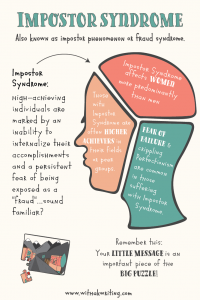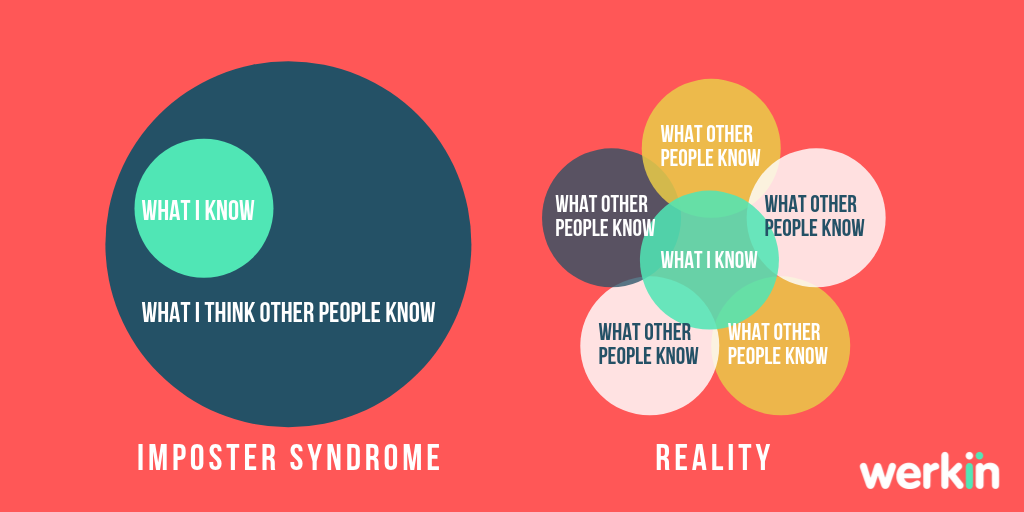5 top tips on how to overcome impostor syndrome
7 Oct 2020

|
This is a guest blog by SSE fellow, Yaa Antwi-Nsiah, a graduate of our Lloyds Social Entrepreneurs Start Up programme. Find out more about Yaa’s mentoring and coaching work at the bottom of this article. |
Have you ever said to yourself:
“I don’t know what I’m doing.”
“Any moment now, someone’s going to catch me out.”
“Why did I even attempt this?”
“I’m such a failure. A total, absolute failure.”
If you have, then you are amongst 70% of people who suffer from Impostor Syndrome.
Impostor Syndrome is the overwhelming feeling that you are undeserving and unworthy of your success. You feel less intelligent, capable or talented than you actually are. You believe that your accomplishments are a result of luck or coincidence, and you are afraid that you will be exposed as a fraud.

Image: withakwriting
Impostor Syndrome can be a major obstacle to achieving your goals, especially for women who tend to be more susceptible because they produce less testosterone aka the confidence hormone.

Image: Werkin
The good news is you can overcome Imposter Syndrome by reframing your thinking. If you want to stop feeling like an impostor, you have to stop thinking like an impostor. This is a process that happens over time.
Here are 5 top tips to help you reframe your thinking and overcome Imposter Syndrome:
-
Talk about it.
Have a good support network where you can have open conversations about your challenges without feeling judged. You also get to hear how other people have dealt with feeling like an impostor. It can be such a relief to know you’re not the only one.
-
Collect positive feedback
Get a journal to record all your wins e.g. winning an award, people giving you praising or client testimonials. Whenever you need a boost, take a look in your journal – it’s proof!
-
Place blame accordingly
We all make mistakes, but it’s important to recognise what is actually your fault. For example, the scientist who kept blaming herself for problems in her lab. She started recording every time something went wrong and realised most of the problems came from equipment failure. She was actually far more competent than she gave herself credit for.
-
Let go of trying to be perfect
Don’t try to be perfect, nobody else is. Just focus on doing a great job when it matters. Making mistakes is the best way to learn. Forgive yourself when the inevitable mistake happens and don’t obsess over it. Instead ask yourself “what can I learn from this to help me to be better next time?”.
-
Get Excited
Your body doesn’t know the difference between feeling scared and feeling excited. Start telling yourself that you’re excited whenever you do something that scares you, and over time, you will believe your new thoughts.
BONUS TIP:
-
Hire a Coach and/or Mentor
When Imposter Syndrome festers, you risk not doing your best which would be such a waste with all you have to offer.
Working with a coach or mentor can help build your confidence and develop a positive mindset. This allows you to stop feeling like you’re “not good enough” and start recognising how great you are.
Overcoming Impostor Syndrome takes time. You need to be focused and determined, and follow through on making a lasting change. This allows you to build confidence in these simple truths: you have talent; you are capable, and you belong.
To help you along the way, you can download my FREE Release Your Mindset Blocks Guide. In it, you discover the 7 mindset blocks that keep you stuck, overwhelmed and from living your best life. You can download it here: nextlevelcoachinggroup.com/getstarted.
WRITTEN BY:

Yaa Antwi-Nsiah
Yaa Antwi-Nsiah – Founder, Next Level Coaching
Hi, I’m Yaa, the “Meant for More” Mindset Mentor and Coach.
As a lifestyle architect, I help Professional Women who are ready to reach their next level eliminate negative self-talk and breakthrough what’s been holding them back so they can have clarity, confidence and prosperity in their career and lifestyle.
If you have any questions about this article or want to know more about me and what I do, feel free to reach out to me on Instagram: @nextlevelcoachinggroup and LinkedIn: https://www.linkedin.com/in/ynsiah.
Additional Resources:
Infographics
- Are you Suffering from Impostor Syndrome?
- Understanding and Escaping Impostor Syndrome
- How to Improve Confidence
Youtube videos
- What is imposter syndrome and how can you combat it? | Elizabeth Cox
- Thinking your way out of imposter syndrome | Valerie Young
|
Looking for a mentor, a free learning programme and a grant? Our Lloyds Bank and Bank of Scotland Social Entrepreneurs Programme, includes a business mentor, 14 learning sessions over a year, a grant and a peer-support network. It’s run by the School for Social Entrepreneurs, jointly funded by The National Lottery Community Fund. For social entrepreneurs starting out, trading up or scaling. |
